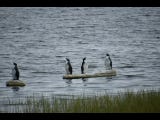Notes from an Environmentalist; Rare, Greenhead Eating Downditch Penguins sighted off Newburyport, Massachusetts.
Notes from an Environmentalist
Researchers Discover that Plum Island Sound Penguins Consume Vast Quantities of Greenhead Larvae. {parody}
AP On June 18th the director of the Fish and Wildlife Service, Aurelia Skipwith, flew up from Washington D.C. to the Parker River Wildlife Refuge to observe the only existent colony of Downditch Penguins in the Northern Hemisphere.
Apparently named after the moon jelly fish, Aurelia Aurelia, the winsome director was called in to referee a fierce debate being waged in the scientific literature about the origins of the Joppa Flats Penguin population.
Conservation ornithologist Dr. H. Frumpfeather Birdwhistle has long maintained that the flightless birds swim south on the Labrador Current in the spring.
However former Ipswich resident Sir Michael Downditch who discovered the population states, “Why that is absurd! It is simply a non-migrating remnant population that became isolated after the glaciers retreated 10,000 years ago.”
He goes on to explain that the birds now dig into Plum Island Sound’s soft mud during the winter and don’t emerge until the first full moon high tide of June.
“They have small appendages specially adapted for removing small blocks of ice from beneath the marsh that they then use to give themselves cold feet until the mating season commences in July. This coincides with the peak Greenhead season when the vicious Tabanids are most plentiful.”
During this time the birds can be observed feeding, fecundating and articulating until the rapidly declining temperatures of autumn send them back under the Joppa Flats marsh thatch where they consume vast quantities of Tabanid larvae throughout the winter months.
It has also been learned that researchers at MBL Marsh Lab, NE BioLabs and the University of Vermont are negotiating with the Quebec Labrador Foundation to establish a similar breeding colony of the Tabanid feeding Downditch penguins at Bent Apple Farm Pond in South Londonderry Vermont.
They hope to install the colony before the second Lunar Anniversary slated for July 2024.
####
Bill Sargent is a science and occasional parody writer. His most recent book, North of Boston, Living on the Edge of a Warming World is available in local stores and through
http://plumislandoutdoors.org
, and at www.ingramcontent.com.




I understand, through unnamed source at the National Wildlife Research Center, that the down ditch penguins lay their eggs underneath a large pink house built in the middle of the marsh about a mile from their feeding ground; they hatch every 50 years and migrate via human dug ditches in the great marsh ecosystem. Both the house and the ditches are threatened through a government reassessment of the impact of human built structures.